I'm trying to access variables that are contained in functions after an operation is performed in another Python script, but I don't want to run through the operations of the function, I just need access to the returned value of the variables gh and user.
I've tried different ways to do this such as setting the initial value of the variable to None in the main script, but the problem I run into is when I do an import of script1 into script2, it runs through the script and resets the variable in question to None again. In addition, I've tried to wrap them in a class with no luck.
Also, I've tried using if __name__ = '__main__': to run the functions, but I can't seem to figure out how to get the values out of the functions into script2 to use as global variables.
I've seen some answers here that may work such as returning the values of the function to another function for use??, but I I can't quite nail the syntax as the function doesn't seem to hold the value of the variable.
If I have asked this question incorrectly, please let me know how to improve it as I'm trying to ask "good" questions so I don't get banned. I'm still learning and I do ask a lot of questions here, but I've learned a lot by doing so.
script1.py:
#! /usr/bin/python
import github3
from github3 import login, GitHub, authorize
from getpass import getuser, getpass
import requests
import configparser
def getCreds():
try:
user = input('GitHub username: ')
except KeyboardInterrupt:
user = getuser()
password = getpass('GitHub token for {0}: '.format(user))
gh = login(user, password)
if __name__ == '__main__':
getCreds()
exec(open("next_file.py").read())
script2.py
import os
import github3
from github3 import login, GitHub, authorize
from getpass import getuser, getpass
import requests
import csv
import configparser
import sys
import script1
import codecs
gh = script1.gh
user = script1.user
def one_commit_one_file_change_pr():
#open csv file and create header rows
with open('c:\\commit_filechange.csv', 'w+') as f:
csv_writer = csv.writer(f)
csv_writer.writerow(['Login', 'Title', 'Commits', 'Changed Files','Deletions', 'Additions'])
for pr in result:
data = pr.as_dict()
changes = (gh.repository(user, repo).pull_request(data['number'])).as_dict()
if changes['commits'] == 1 and changes['changed_files'] == 1:
#keep print to console statement for testing purposes
#print changes['user']['login']
with open('c:\\commit_filechange.csv', 'a+') as f:
csv_writer = csv.writer(f)
csv_writer.writerow([changes['user']['login'], changes['title'], changes['commits'], changes['changed_files']])
one_commit_one_file_change_pr()
